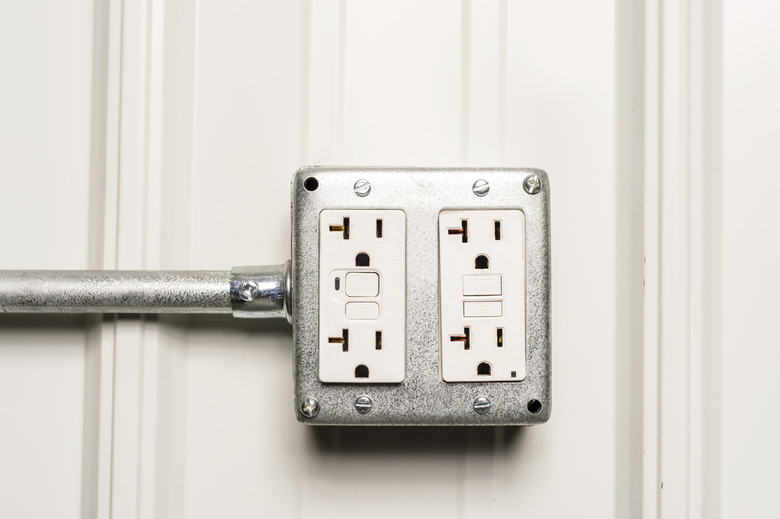What Is The Unit Of Power?
Physicists use everyday words in seemingly strange and very specific ways. For a physicist, work (W) isn't what you do from nine to five on weekdays. It's the product of the force (F) applied to an object multiplied by the distance (d) the object moves as a result of that force.
\(W=Fd\)
If the object doesn't move, no work has been done. Try explaining that to the man who is trying to push your car out of a ditch and having no luck getting the car to move.
Physicists also use the word power (P) in a specific way. For them power isn't what you get by eating a hearty breakfast. It's the time (t) it takes to do a certain amount of work. The power equation is:
\(P=\frac{W}{t}\)
In other words, power is the rate of doing work. It's also the rate of transfer of heat and electrical energy. In the study of electricity, the power formula is:
\(P=VI\)
where V is the voltage in a circuit and I is the current flowing through that circuit.
Knowing what the word "power" means to physicists helps you understand the units of power. In the SI (metric) system, the units are watts. When measuring in the Imperial system, the units are either foot-pounds/second or horsepower. One horsepower is equal to 550 foot-pounds/second.
Watts Are the Units of Power in the SI System
Watts Are the Units of Power in the SI System
The SI (Système Internationale) system – also known as the metric system – has only seven base units. All the other units are derived from these. In the SI system, length is measured in meters, mass in kilograms and time in seconds. Force is equal to mass times acceleration (from Newton's second law), so the units are kg-m/s2. That means the units of work are kg-m2/s2. Rather than use these units in every calculation, which would be cumbersome, scientists define a joule (J) (named after physicist James Prescott Joule) as 1 kg-m2/s2. The joule is also the unit of energy in the SI system, although it's customary to use ergs when measuring in centimeters and grams.
\(1\text{ joule}=1\text{ kgm}^2\text{/s}^2\text{ }\1\text{ erg}=1\text{ gcm}^2\text{/s}^2\)
Power is defined as work divided by time, so its units are joules/second. Scientists have another name for this unit, too. It's the watt, named after James Watt, the Scottish inventor who helped develop the steam engine that powered the Industrial Revolution. In the SI system, the watt is defined as:
\(1\text{ watt} = 1\text{ J/s}=1\text{ kgm}^2\text{/s}^3\)
If you're measuring in the centimeters and grams, use this conversion:
\(1\text{ watt} = 10^7\text{ ergs/s}=10^7\text{ gcm}^2\text{/s}^3\)
What Is a Horsepower?
What Is a Horsepower?
If you like cars, you know the power ratings of car engines are always given in horsepower. That means horsepower is also a unit of power, but where did it come from, and why is it still in use?
It turns out that none other than James Watt is the man responsible for this unit of power. In order to sell his steam engines, he had to quantify the amount of work they could do in a certain time. He created a unit based on how much work a single pit pony could do. It was well known at the time that a single pony could lift 220 pounds of coal up a 100-foot mine shaft in one minute. That translates to 22,000 ft-lb/min. He then incorrectly assumed that a regular horse could do 50% more work and arbitrarily defined the horsepower as 33,000 ft-lb/min, which is the same as 550 ft-lb/s. In SI units, that's 745.7 watts.
As a unit of power, the horsepower is usually reserved for engines and – sometimes – air conditioner cooling capacity. Why do we still use it? Probably for the same reason that people in some countries, including the United States, still use the Imperial system of measurement: habit.
Cite This Article
MLA
Deziel, Chris. "What Is The Unit Of Power?" sciencing.com, https://www.sciencing.com/unit-power-5063891/. 15 December 2020.
APA
Deziel, Chris. (2020, December 15). What Is The Unit Of Power?. sciencing.com. Retrieved from https://www.sciencing.com/unit-power-5063891/
Chicago
Deziel, Chris. What Is The Unit Of Power? last modified August 30, 2022. https://www.sciencing.com/unit-power-5063891/
